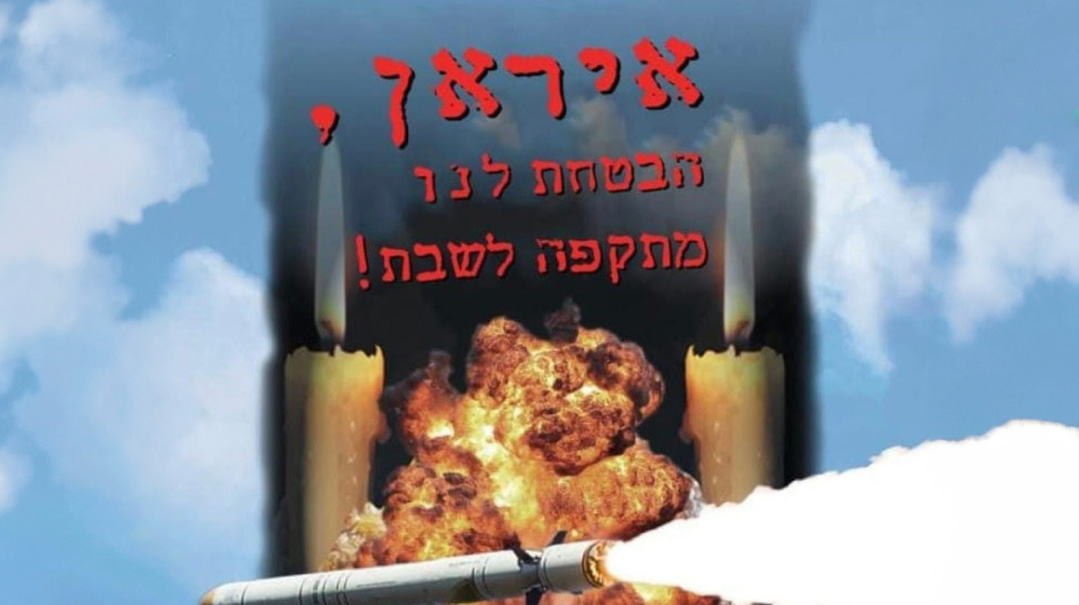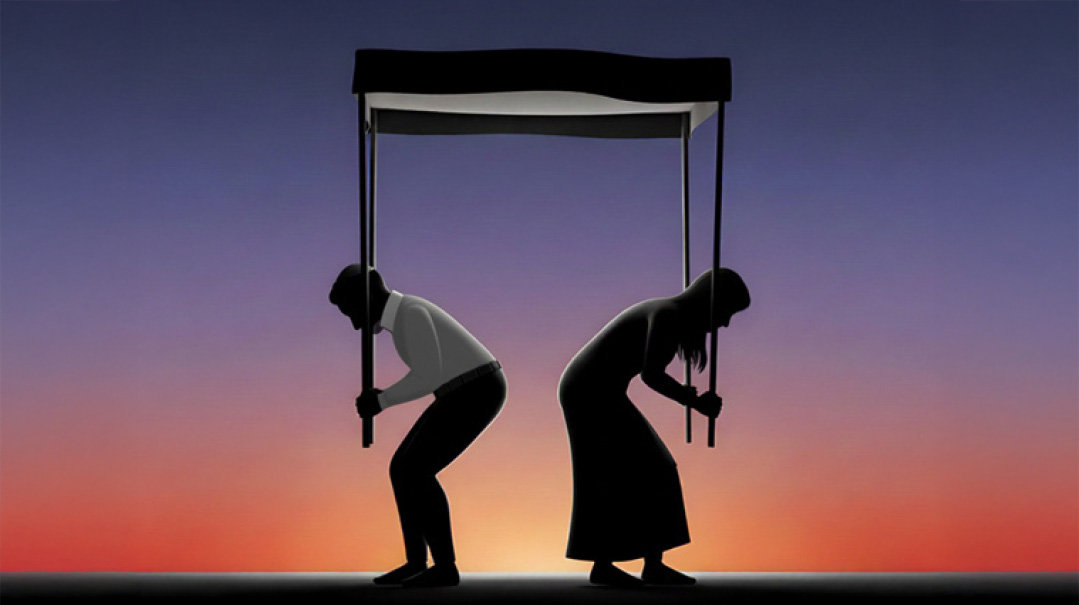The Only Way Out Is Through

When you live in a country surrounded by genocidal enemies, it helps to be tough

“IMA,
you promised us chicken for Shabbos” is probably one of the most ubiquitous and successful fundraising slogans in Israel. A pitch for the Chasdei Naomi organization, it’s plastered on tzedakah boxes and posters in virtually every religious neighborhood: a blue background framing spidery red letters atop an image of glowing candles and a freshly roasted chicken.
Last week, Israelis smiled sardonically as they circulated a meme with the familiar blue background and red letters — just this time, the chicken was replaced by an exploding missile and the words read, “Iran, you promised us an attack for Shabbos.”
It was a testament to the dark humor that girds Sabras through their fraught existence. When you live in a country surrounded by genocidal enemies, it helps to be tough — and to be able to joke through the conflict du jour.
The Iranian threat is the furthest thing from a joke, however, and as we go to print, the country is beginning yet another week of collective breath-holding, watching and waiting for the promised Iranian reprisal. Living on high alert day after day after day is its own form of agony, and there’s no doubt the decision-makers in Iran are delighting in the tension we feel.
“Did you stock up on water? Do you have batteries?” the proprietor of the local shoe store asked me as she fitted one of my sons for new sneakers. “Our rav said we should, and he is the gadol hador, so we stocked up.”
School is out and families are weighing their limited vacation options. There’s the moral and emotional calculus: Is it right to seek a recharge while the country is at war, and so many fathers, brothers, and sons are facing mortal danger in enemy territory? Is it even sane to think about parks and picnic lunches with this attack hanging over our heads? But is it any saner to keep children cooped up in small apartments and allow anxiety to constrict their lives?
Then there are the practical considerations: Which parts of the country are still safe for a summer outing? If and when the attack begins, what kind of shelter options will be available? If you want to leave the country, which airlines can be relied on to get you back?
Last time Iran sent a barrage of missiles to decimate us, just a few days before Pesach, we merited an incredible salvation. For those of us who’d been feeling shaky about the relationship with our Father — does He still love us if He allowed so much death and grief to visit his people? — it felt like a palpable Divine hug. We found solace and strength in that very public proclamation that we are still His favored children, still deserving of that supernatural anan that encased us as we fled Mitzrayim thousands of years ago and again as we took out our Pesach dishes in 2024.
When Iran unleashed the current threat, though, the timing didn’t seem as auspicious. Nissan is the month of redemption: a season of budding flowers and new beginnings, a period when salvation blossoms and open miracles visit the Jewish nation. Bein hametzarim, not so much.
You would think that after millennia of tough lessons, we’d be good at bein hametzarim. With our annals of anguish and the accompanying inherited trauma, we should know by instinct how to settle into these three weeks of mourning. It should feel natural, comfortable even, to sit with our losses, allowing the desolation to seep into us and fill every crevice of our consciousness.
But for many of us, the attitude toward this period has always been, “Let’s just fast-forward and get past it.” Let’s focus as little as possible on the bitterness and mourning and get on with Color War. Let’s blur out the Nine Days restrictions and plan the Shabbos Nachamu menu. We know there’s work to be done and spiritual gains to be made during our national time of mourning, but in this film that is the Jewish year, we want to skip the moments of dread and darkness, and get to the part with the happy music already.
Can you blame us? We know that the pain has a purpose, and that only those who truly mourn what we lost will have the capacity to celebrate its restoration. But the process has been so long and so draining. It’s been so many thousands of years that we keep hoping to see the other face of Av, the Father who isn’t resorting to painful blows to pull His children away from the brink.
Last week, when I saw that sarcastic meme — “Iran, you promised us an attack for Shabbos” — I didn’t only see a darkly comic show of bravado, or a taunt to the enemy. I also saw a plea: Let’s just get this over with.
We know that sometimes, the only way out is through — but the tension and uncertainty are torturous enough. Whatever the other side is, we want to be there already. We want to be sitting in that circle around a campfire, swaying to the soft strains of Nachamu, letting its message quiver on our guitar strings and heartstrings: Take comfort, My people. Your dues have been paid, your sins wiped away, the time for consolation has come.
(Originally featured in Mishpacha, Issue 1024)
Oops! We could not locate your form.







